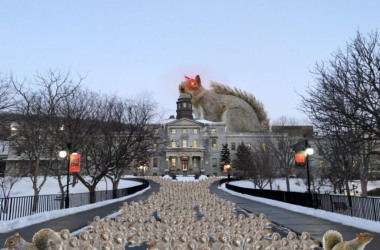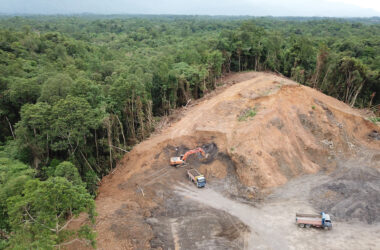The scientific tool of cloning, which allows humans to duplicate organisms, has soared since the birth of first-ever mammalian clone Dolly the sheep. But how has this now commonplace discipline evolved, and where might it head in the future? Scientists must continue to grapple with the ethics of such a[Read More…]
Science & Technology
The latest in science and technology.
Cloudberry 101: The ecology of the urban squirrel
Although the eastern grey squirrel (Sciurus carolinensis) is native to eastern North American regions such as Montreal, their adaptive traits allow them to thrive elsewhere, like British Columbia or Europe, where they are categorized as an invasive species. Despite their name, some have dark brown or black coats. But common[Read More…]
No such thing as empty land: Agricultural expansion and displacement in South America’s Gran Chaco region
The destruction of the world’s rainforests has long been framed as an environmental problem. Extractive logging, mining, and agricultural practices have led to the loss of millions of acres of wildlife and have emitted massive quantities of carbon dioxide (CO2) into the atmosphere. But for years, activists have argued that[Read More…]
CHIME telescope maps the expanding universe
On Apr. 28, 2020, an unusually intense fast radio burst (FRB) was detected by the Canadian Hydrogen Intensity Mapping Experiment (CHIME) telescope located near Penticton, British Columbia. Although it was only partially captured by the telescope, the radio burst was intense enough in magnitude that, according to scientists working on[Read More…]
The changing landscape of industrial mining
From the diamonds in Nunavut to the gold in British Columbia to the iron ores in Labrador, Canada has a multitude of resources spanning from coast to coast to coast. Producing over 30 different minerals and metals, it is no surprise that Canada plays a substantial role in the global[Read More…]
Biology symposium investigates modes of language learning
How language plays a role in the evolution of human societies remains a fascinating question for language researchers, given the diversity of language learning techniques and abilities. Some McGill researchers, however, are one step closer to finding the answer. On Nov. 15, a symposium on the “Cultural Evolution of Communication”[Read More…]
Computational witness stand: A new way to prevent credit card fraud
In 2018 alone, reported fraud cases increased by 18.4 percent from the previous year and over 20 billion dollars were lost. Although not the only source of card fraud, one major concern is the security of Automated Teller Machines (ATMs). With the spread of ATMs throughout the world, personal banking[Read More…]
In conversation with Dr. Sarkis Meterissan
On average, 76 women in Canada are diagnosed with breast cancer every day. October continues to be an important month for raising awareness and funds to support research and women battling breast cancer across the country. Dr. Sarkis Meterissan, surgical oncologist and director of the MUHC Breast Clinic, is one[Read More…]
Going nuclear: The future of sustainable energy
As the 2021 United Nations Climate Change Conference (COP26) drew to a close on Nov. 13, questions about the future of climate initiatives saturated international discourse. One thing is certain: To mitigate the worst effects of climate change, the world must halt its use of fossil fuels as soon as[Read More…]
Science Rewind: How Quebec propelled aviation forward
A brief history of flight Home to Air Canada, Bombardier and the Canadian Space Agency (CSA), Montreal has placed itself among the world’s leading aerospace and aviation hubs. In 1856, the first aircraft ever constructed in Canada was a balloon that carried three passengers from Montreal to Pointe-Olivier, Quebec. Flown[Read More…]















